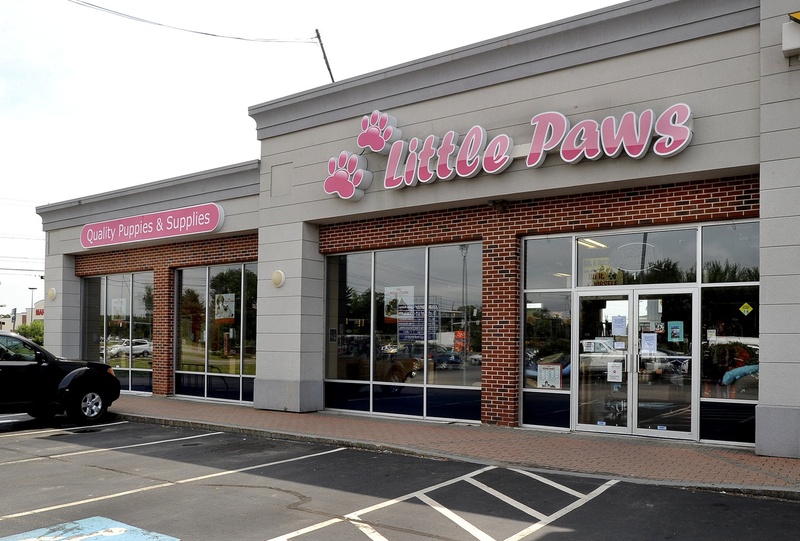SCARBOROUGH — The owner of a pet store in Scarborough that is under quarantine for the second time this year defended her business Tuesday but said she is trying to sell it and get out of selling puppies, in part because of pressure from protesters who oppose commercial-scale breeding.
Barbara Cross, who owns Little Paws on Payne Road, said she began getting phone calls and emails from protesters within an hour after she learned that a puppy sold at her store last week had tested positive for parvovirus, a highly contagious and often fatal disease for dogs.
Groups that oppose what they call puppy mills have protested at the store in the past and are planning another rally for this weekend in response to the parvovirus case.
“The protesters can make your life miserable,” Cross said. “It doesn’t seem worth it.”
The state imposed a two-week quarantine on Little Paws on Monday, after a 9-week-old ori-pei named Sophie tested positive and was hospitalized for parvovirus within a week of being sold.
Little Paws also was quarantined in February because of a case of parvovirus.
The store can remain open during the quarantine, but the 29 puppies it has now cannot be sold. Cross said none of those puppies is showing symptoms of parvovirus.
She said the disease is not isolated to pet stores.
Animal shelters in the area have seen occasional cases, primarily in dogs that come from Southern states, where the disease is more prevalent.
Dr. Christine Fraser, veterinarian for the state’s animal welfare program, said parvovirus is “certainly not common” in Maine, and is seen most often in young puppies that have not been fully vaccinated against the disease. The state does not track the number of cases or related quarantines, Fraser said.
“Generally in the Northeast, we’re pretty educated about animal care,” Fraser said. “We do a good job with vaccinations, so we don’t tend to see it as much in our native populations of dogs.”
Cross, who said she will reopen her store Wednesday after being closed for two days to sanitize and reseal floors, said she buys dogs from only reputable breeders who treat the puppies well. But members of Maine Citizens Against Puppy Mills said they consider such USDA-licensed commercial breeders to be puppy mills.
“We believe cruelty and suffering is inherent in that industry,” said Carol Reynolds, a member of Maine Citizens Against Puppy Mills. She said adult dogs often live and are bred in wire-bottom cages, for example.
Maine Citizens Against Puppy Mills asked Scarborough officials last year to adopt an ordinance to ban sales of cats and dogs in pet stores. The town’s ordinance committee decided not to pursue a ban.
Cross said she could not immediately provide a list of all breeders she uses, but said her favorite is Linda Purifoy, a breeder in New Boston, Texas.
Federal inspection records show that Purifoy’s kennel is licensed and has had several problems in the past three years, including incomplete records for 10 dogs and dirt and algae in water bowls. The issues raised in past inspections were fixed and have not reoccurred, according to inspection records.
Tina Bark of Westbrook, who bought Sophie from Little Paws, said a pet shop employee told her the dog came from Lonewolf Kennels in Iberia, Mo.
Federal inspection records show that breeder has been asked to fix one problem since 2011. In December 2012, an inspector told the kennel owner to fix eight outdoor dog enclosures that lacked adequate protection from wind and rain.
Neither Purifoy nor Lonewolf Kennels appears on the Humane Society of the United States’ “Horrible Hundred” list of puppy mills with deficiencies or inadequate attention to animal welfare.
Cross, reached by phone Tuesday while she was buying supplies to clean the store, said protesters target her store even though shelters also occasionally have puppies with parvovirus. She said her decision to sell the store — possibly to someone who wants to turn it into a pet adoption center — has been influenced by the pressure from protesters.
Cross said two of the 600 dogs she has sold at Little Paws have tested positive for the virus and she has no way of knowing whether they contracted it at the store.
“It’s going to happen. It’s unfortunate,” she said. “I feel like I’m putting in a diligent effort to do the right thing. Will some dogs still get sick? Yes.”
Fraser, the veterinarian, said parvovirus is a “young puppy disease,” which is why it is most commonly seen in pet stores and at shelters. Dogs are usually fully vaccinated by the time they are 12 weeks old, she said. They can be sold at eight weeks, before they have all of their shots.
“That’s where the weakness is,” Fraser said.
The Animal Refuge League of Greater Portland has not had any cases of parvovirus in recent memory, although it takes precautions to prevent the spread of any contagious disease, said Lynne McGhee, community relations manager.
Any dogs that come to the shelter through a rescue transport are quarantined for five days so their health can be monitored, as required by the state, she said.
Bobbi Allen, manager of the Animal Welfare Society in West Kennebunk, said she has seen 10 cases of parvovirus in the 15 years she has been at the shelter. She said people can protect pets against the disease by ensuring they are properly vaccinated and get regular medical attention.
Gillian Graham can be contacted at 791-6315 or at:
ggraham@pressherald.com
Twitter: grahamgillian
Send questions/comments to the editors.





Success. Please wait for the page to reload. If the page does not reload within 5 seconds, please refresh the page.
Enter your email and password to access comments.
Hi, to comment on stories you must . This profile is in addition to your subscription and website login.
Already have a commenting profile? .
Invalid username/password.
Please check your email to confirm and complete your registration.
Only subscribers are eligible to post comments. Please subscribe or login first for digital access. Here’s why.
Use the form below to reset your password. When you've submitted your account email, we will send an email with a reset code.